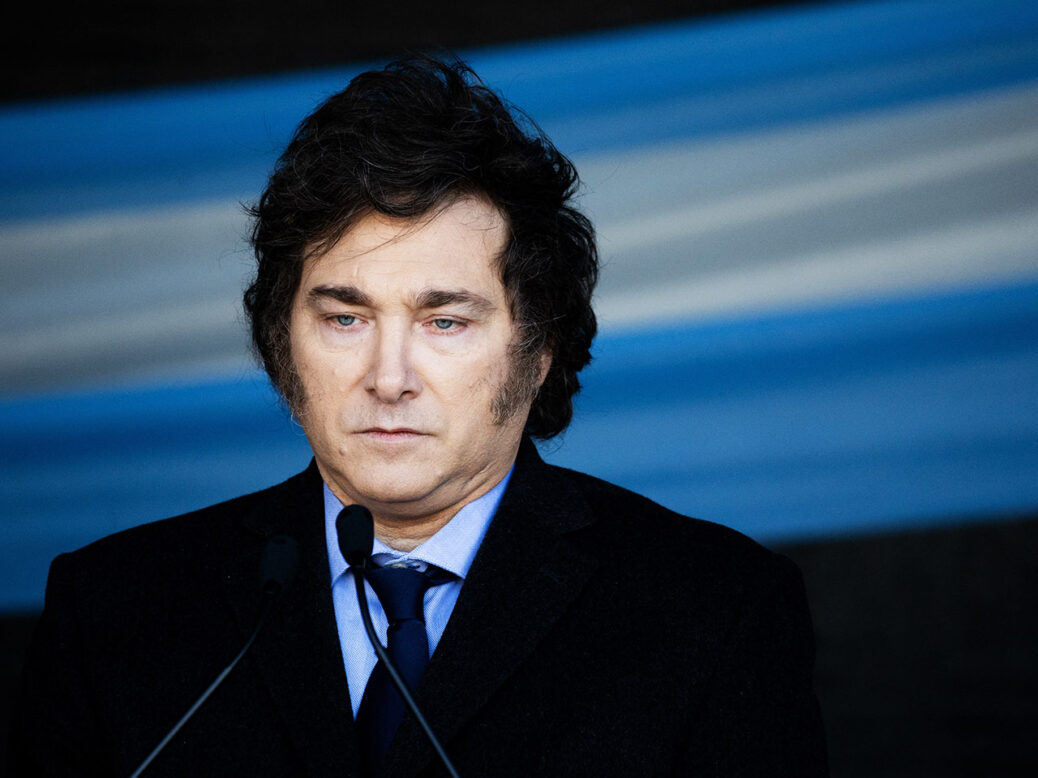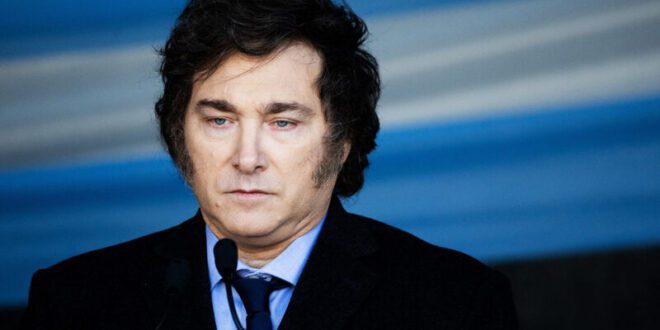rewrite the main part of

In November 2024, Hassan El Bacha received a call he had been dreading. After 13 years of broadcasting, the weekly Islamic culture programme El Cálamo was to be pulled from Argentina’s public television channels with immediate effect. It was a directive from the government’s Ministry of Foreign Affairs, International Trade and Worship.
While the news was met with “a lot of indignation” from the Muslim and Arab communities in Argentina, “unfortunately it wasn’t a surprise,” said El Bacha, who is secretary-general for the Centro Islámico de la República Argentina (CIRA), the NGO that produces the show. “We were given no answers as to why El Cálamo was cancelled, and no indication that it would return. But we believe it was an Islamophobic act,” he told me – something his community has become increasingly accustomed to.
In recent months, discrimination and harassment of Muslims and Arabs in Argentina have escalated, according to the CIRA, citing a shift in public attitudes that has been fuelled by far-right talking points. “Women are being verbally attacked in the street for wearing the hijab and we’re seeing an increase in hate speech and harassment online,” El Bacha told me. He noted that an escalation of physical attacks hadn’t been recorded, “but we are deeply concerned”.
Argentina’s Muslim population, estimated by CIRA to number between 800,000 and a million, makes up the largest Muslim community in South America. While the viewership of El Cálamo was relatively modest (around 100,000 each week), religious leaders say its cancellation is the latest in a series of state-sanctioned Islamophobic attacks under the far-right administration of President Javier Milei, who took office in December 2023. “The decision to remove the programme without any reason for such a measure constitutes an act of discrimination, censorship and Islamophobia that harms and undermines inter-religious dialogue and coexistence,” CIRA said in a statement at the time.
This isn’t the first time El Cálamo has faced controversy: in March 2024, the show was abruptly suspended from public channels following a dispute over music rights. After a period of silence, the government stated that “the removal was due to a debt with SADAIC”, the Argentine body responsible for collecting artists’ royalties. CIRA insisted any outstanding debts had been paid. El Bacha is certain the reasons were more cynical: “It was no coincidence that the censorship happened during Ramadan,” he said.
Was the show critical of Milei? “[CIRA] has never criticised a government or a president in all our 100 years of history,” said El Bacha. “Most of the programmes deal with religious topics, related to Arab and Islamic culture. We have done interviews at some pro-Palestine demonstrations, but never [interviews] criticising the government.”
In the first year of his presidency, Milei – a self-described anarcho-capitalist who describes himself as “almost Jewish”, though he is yet to convert officially to the religion – has made clear his political alignment with Israel, criticising the United Nations for pushing socialist “ideologies” and what he claims is pro-Palestinian rhetoric on its members. “We have seen how an organisation that was born to defend people’s rights has become the biggest proponent of systematic violations of freedom,” Milei told fellow leaders at the UN’s 79th General Assembly in September.
In predominantly Catholic Argentina, Milei has been criticised by human rights groups for discrimination against Islam and people from Arab backgrounds. His minister for religion, Francisco Sánchez, has also been accused of Islamophobia. In the week of Hamas’s 7 October attacks, Sánchez posted, “Today marks 452 years since the Catholic forces defeated the Ottomans in the Battle of Lepanto. A good day to remember the feat that saved Christianity and the entire West from the Islamic hordes.”
Last year, the National Institute against Discrimination, Xenophobia and Racism reported 80 incidents of Islamophobia over the previous 12 months. More recent figures are difficult to find since Milei shut the institution down in August, firing 30,000 employees and stating that the agency “served no purpose”.
“Right now, we are seeing attacks on the Arab and Muslim community on an unprecedented scale for Argentina,” El Bacha told me. “The problem we see is that the government encourages this with news and comments that are not true.” The phrase “Islamic terrorism” crops up repeatedly in Milei’s speeches and public statements, much to the anger of the Islamic community. “The president spoke of ‘Islamic terrorism’ in four [recent] speeches and he did not apologise. That makes people infer that all Muslims are terrorists.”
Rafael Rezende, a professor of sociology at Rio de Janeiro State University, said he is “particularly concerned about [both] the rise of Islamophobia and anti-Semitism in Argentina” as a direct result of this rhetoric. “To understand Milei’s Islamophobic statements, you must consider his relationship with Judaism and the state of Israel,” explained Rezende, whose research specialises in Argentine politics. “Milei positions himself internationally within a political sphere where [the Israeli prime minister Benjamin] Netanyahu holds a significant role. With this in mind, Milei creates a false and crude antagonism between Jews and Muslims, repeating the political strategy of fabricating a false enemy in the cultural war.”
Argentina has not seen pro-Palestine rallies of the likes organised in Europe and the US since the war in Gaza began. The consensus, even among the country’s busy liberal activist groups, is that Argentines have their own issues to worry about: the government’s dramatic cuts in public spending have affected pensions, healthcare provisions and energy prices, which pushed the nation’s poverty rate to 53 per cent in the first six months of Milei’s presidency, the highest level for two decades.
“Milei was elected for his promises to resolve Argentina’s long and deep economic crisis,” said Rezende. “However, his economic measures have so far been largely ineffective and highly unpopular.” He thinks that Milei’s attacks on minority groups are a way of shifting the public narrative away from these economic tensions, pushing the blame for social collapse towards a common enemy, all the while bolstering Milei’s image as a protector of “traditional” values. “Milei has had to engage in a ‘culture war’, constructing a conservative narrative in which [he] defends the people, the family, and traditions from alleged threats.”
It’s no coincidence that Milei, like many populist leaders, has adopted messianic rhetoric – though he takes his to the extreme, claiming to have been chosen for leadership by God in order to save Argentines from “evil forces”. (This is just one of several insights Milei claims to have obtained via the spirit of his dead dog, Conan, whom he says he refused to fight in the Colosseum in Rome in a past life because they were destined to join forces thousands of years later.)
The president is also open about his connection to Israel. Milei’s second international trip as president was to Israel – the first being to Davos, where he delivered a speech criticising feminists, environmentalists and the concept of social justice. He is planning another trip to the country in late March. His government has also voted against recognising a Palestinian state at the UN in May 2024, a dramatic break from its historic diplomatic stance.
At a time when Milei’s popularity ratings are slipping – his popularity dropped by 15 per cent last September, and one survey this year finds his disapproval rating at 50 per cent – censorship of programmes like El Cálamo are not only an anti-Muslim act, but also one of narrative control, suggested Teresita Frías, a newspaper journalist and radio presenter based in Salta, northern Argentina. “The show’s cancellation could be interpreted as part of a strategy by Milei’s government to both control the content of public media and silence dissident or minority voices. The lack of transparency in the decision taken and the fact that it was the only religious programme removed from public television reinforce this perception,” said Frías.
Frías made national headlines for a public clash with the president back in 2018 before he was president. Milei was charged with gender-based violence after publicly humiliating Frías during a press conference, shouting at her and calling her a “burro” – literally “donkey”, a slang word in Argentina with racial undertones meaning “ignorant” or “uneducated” – for asking him a question about Keynesian economics. He was convicted by the Argentine justice system and ordered to publicly apologise to Frías and undertake a course of psychological therapy, a judge deeming him a “risk to himself and to others”. (The penalty was never carried out.)
“We shouldn’t overlook the fact that the Muslim community in Argentina has historically faced episodes of discrimination and prejudice, even more so under right-wing governments,” Frías noted. She referenced a controversy from 2018 when Patricia Bullrich, now the security minister, was reported to have told a room of journalists that “if they are Muslims, they are terrorists”.
“There has always been… intolerance but the elimination of El Cálamo is a clear act of exclusion,” said Frías. “Both factors, media control and discrimination, are worrying for cultural diversity and freedom of expression in Argentina.”
After months of stress, El Cálamo quietly returned to air on public television in late January. The price for its recovery was a public statement from CIRA to “clarify the situation”, El Bacha told me. In a social media post, the body said: “The reason for [El Cálamo’s] temporary suspension has been resolved… We want to clarify that there has never been censorship against our community or creed. And that the motives for the temporary suspension have been alien to the National Government.”
El Bacha was careful during our final conversation not to use the word “censorship”, despite CIRA’s previous statements using exactly that term. But he was quick to add his own disclaimer about the public statement: “We only did it to be polite.” It seems in Javier Milei’s new culture war, minority voices like El Bacha cannot afford to be anything but.
[See also: Europe alone cannot rescue President Zelensky]
Content from our partners
between 300 to 1000 words in html format and use paragraphs and subheadings with h3 tags.
 Mind Uncharted Explore. Discover. Learn.
Mind Uncharted Explore. Discover. Learn.



